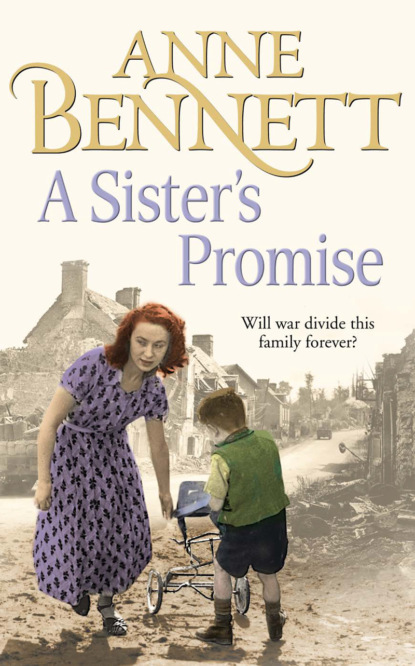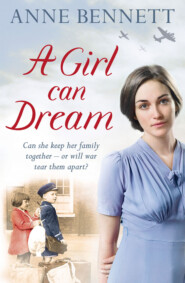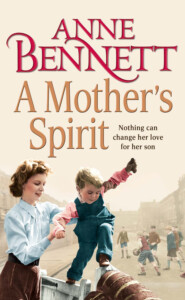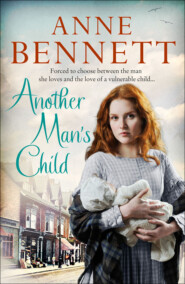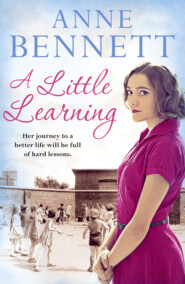По всем вопросам обращайтесь на: info@litportal.ru
(©) 2003-2024.
✖
A Sister’s Promise
Настройки чтения
Размер шрифта
Высота строк
Поля
Chapter Twenty-Seven (#litres_trial_promo)
Chapter Twenty-Eight (#litres_trial_promo)
Chapter Twenty-Nine (#litres_trial_promo)
Keep Reading (#litres_trial_promo)
Acknowledgements (#litres_trial_promo)
About the Author (#litres_trial_promo)
Also by the Author (#litres_trial_promo)
About the Publisher (#litres_trial_promo)
ONE (#ulink_08993b8f-ecd9-5bff-a3d1-8a04aa413cf8)
‘Molly, they will come no quicker with you running to the window every five minutes,’ Stan Maguire told his granddaughter.
‘I know, but I can’t help it,’ Molly said, turning so quickly her dark brown plaits slapped either side of her face. Her large brown eyes were sparkling. ‘Dad has been left for flipping ages and I’m dying to see Mom.’
‘Well, think what it’s like for young Kevin,’ Stan said. ‘Must be a sight worse for him, and your flitting about does him no good at all.’
Molly immediately felt contrite because she knew her grandfather had a point. Her mother, Nuala, had been in hospital for nine terrifying weeks, when the cold she was trying to work off turned into pneumonia in the middle of February. She had very nearly died.
When the hospital said she was well enough for visitors, Molly had been allowed to go because she was over twelve – in fact she had turned thirteen a few days before her mother had been taken to the hospital. She would go with either her granddad, Stan, her father, Ted, or Hilda Mason, their next-door neighbour and her mother’s best friend. Not that anyone had been able to go often, for visiting was only allowed on Wednesday and Saturday evening for one hour, though her father could also see his wife for two hours on Sunday afternoon.
Still, Molly had seen her and rejoiced as she watched her improve though at first her recovery was so slight she would wonder afterwards if she had imagined it. And then one day she had gone in to find her mother propped up in bed instead of prone, her beautiful hair tied back from her face with a ribbon, and wearing the peach-coloured bed jacket her father had bought for her. She also wore a wide smile for Molly, despite the fact her face was as white as lint and her eyes heavy with fatigue.
When Molly felt her mother’s arms encircle her and she had drunk in the familiar smell of her, she had sighed in contentment. She knew in that moment that she would recover and that was what she had told Kevin when she got home. He had let his breath out in a loud sigh and Molly realised he had been worried that he would never see his mother again. She knew he had missed her sorely. He had had his fifth birthday in March and when they had asked him what he wanted he said the best birthday present he could have was to have his mommy home.
However, from the day Molly assured him their mother was getting better, Kevin had marked the days off on the calendar and today, Tuesday 23 April 1935, was circled in red. He had been fizzing all day, like a bottle of pop. Molly thought it a shame that her mother hadn’t been allowed home before Easter but the hospital hadn’t thought her well enough. Kevin had been disappointed at first and he had saved part of the chocolate egg their father had given them both the Sunday before to share with her. Molly thought that really good of him because, like Molly, he had given up sweets all through the forty days of Lent anyway. He must have sorely wanted all that chocolate.
Molly was glad it was still the holidays though because she had been able to help Hilda make a big spread to welcome her mother home. While her mother had been ill, Hilda had taught her to make all manner of things, and it was nice to be able to practise, but she just wished now they would hurry up.
Kevin came in from the kitchen with a mug of milk Hilda had poured for him and wiped the milk moustache from his upper lip before saying, ‘Why d’you think they are so late, Granddad?’
‘I don’t rightly know, lad,’ Stan said, for he had thought they would have been here more than an hour ago. ‘Maybe they had to see a doctor before your mom could leave and there was a wait, like. But don’t you fret, they’ll be here as soon as they can be, I’m sure.’
Hilda was just as anxious as the family to see her dear friend Nuala back fit and well again, but she also had duties at home. ‘I’ll come in again when I see them arrive,’ she said, as she covered the food on the table with clean tea towels to keep it fresh, before putting on her coat. ‘Now I’m off to get the old man’s tea, but don’t fret, I’ll be back before you know it.’
Molly smiled at the neighbour that she had known all her life. Hilda had been a great help to her when her mother had first become sick and had tended the whole family along with her own. And Molly often thought it was a good job that she had. Her paternal grandmother, Phoebe, had died when Kevin was just a baby and Molly had missed her very much. There was really no one else, for her father had been an only child.
She had thought then that maybe her granddad would make his home with them, and so had her parents, but he insisted on staying in the little two-bedroomed terraced house in Gravelly Lane that he and his Phoebe had moved into the day they were married all those years ago. Molly’s house was in Osbourne Road, which was no distance away at all, and her grandparents had been a major part of her young life.
This didn’t change essentially after her grandmother died. Ted would still take his father for the odd pint a couple of evenings a week and to watch the Blues play at St Andrews of a Saturday, and every Sunday he came to dinner. However, he was an independent man, who would allow the family to do no more for him. He looked after himself: cooked, washed for himself, kept the house like a new pin and grew much of the family’s produce in his garden.
Molly knew there was family on her mother’s side, on a farm near a place called Buncrana in Donegal, Ireland. Her mother had pointed it out on a map, but they never heard from them and she often said that the Great War had fragmented the family.
‘I’ll tell you now, Molly there was nothing great about it at all,’ Nuala had told her daughter. ‘Dear God! “Terrible War” might have been a better name for it. Almost every country in the world was fighting and men went in their droves to join up. I’ve never understood why. Even my own youngest brother, Finn, marched off with the rest and then lost his life at the Battle of the Somme in 1916. But, even before Finn’s death the people in Ireland were starting to feel a bit cheated, I suppose, because they had been promised Home Rule if Ireland was to support Britain in their fight against Germany.
‘When there was no sign of it, and the Irish boys began to die in large numbers, or were ferried home blinded or with severed limbs, there was that uprising in Dublin the Easter of 1916. Anyway, I’ve told you all this many times before.’
‘I know, but tell it again,’ Molly would say each time. ‘It’s like a fairy story. It was after this Great War, this Terrible War, you came to England, to Birmingham?’
‘Yes. Well, things in Ireland were anything but stable after the uprising. There were troublesome years ahead. It began after the war with factions looting and burning down people’s houses and shooting anyone they didn’t like the look of. The mistress got a bit jumpy about it and, to be honest, I didn’t blame her one bit. Anyway, the upshot of this was they decided to go back to England. They owned another large house in a place called Sutton Coldfield and they offered me the chance to go with them.’
Molly knew all about Sutton Coldfield. On occasions, she had been taken to Sutton Coldfield’s park on the little steam train from the station at nearby Station Road. The park was enormous and even had roads running through it. Rippling streams fed the five large lakes, and there was also woods and pastureland. Unless a person actually lived in Sutton Coldfield, they had to pay to get into the park.
‘I was nineteen years old by then,’ Nuala would say. ‘And of course mad keen to see England, but I didn’t think for one minute that my parents would have let me go. But for the troubles, I think that would have been the case. As it was, they said I would be better out of Ireland for a few years.’
‘And there you met Daddy,’ Molly would usually shout at this point.
‘Not just like that I didn’t,’ Nuala would say. ‘I hadn’t gone to Birmingham to net myself a husband and anyway, there was little opportunity. My employers kept a weather eye on me and in a way were stricter than my parents. Followers, which was what they called boyfriends then, were discouraged. It was the summer of 1921 before I even saw your father as I went walking with the kitchen maid in Sutton Park one Sunday afternoon and he asked If he might walk along with us.’
‘He was a hero, wasn’t he?’ Molly would ask every time.
Naula would always shake her head and say sadly, ‘Believe me, Molly, all of those poor men who had fought in that war were heroes.’
But Molly knew her father, Ted, had got a special medal because he had crawled into no man’s land to save his commanding officer, a man called Paul Simmons.
‘I couldn’t just stand by and do nothing,’ he had told Molly. ‘We had been chatting before we went over the top and the man told me he’d had two brothers and both had copped it and he was the last, the only remaining son so, for the sake of his parents, as much as anything else, he would like to make it back. All that came back to me as I saw him lying there in the slurry of mud and blood of no man’s land and I went out to get him. We both came through it, and all he had to show for it was a gammy leg. Though now he walks with a limp, many live with far worse.’
The point was too that when the war was over, Paul Simmons did not forget the soldier who had saved his life. Before the war, Ted had been a gun maker, working alongside his father from the age of twelve. It was a fine living then, for they exported their guns all over the world. When war broke out, the orders increased, although by then Ted was in the army.
After the war, though, no one wanted guns in any quantity any more and Molly’s father and grandfather were out of work, like thousands of others. Stan said he wouldn’t be bothered chasing the few jobs there were. He was getting older and had savings – for during the war he had earned well and invested wisely, and Phoebe had always been a good manager. Added to that he had the vegetables growing in the garden and a small pension, so they got by.
Molly’s father, though, had been in dire straits until he was sought out by Paul Simmons. His own father owned a brass factory, but he wanted to retire and hand it over to his son. Paul had no objection to this, but he first set out to find the man that had saved his life and see how he was placed. The result of that was Ted was taken into the office and very soon became the young factory owner’s right-hand man.
Molly knew that her mother liked Mr Simmons. She also admired him for paying the debt back, as it were. ‘Oh, I know your father saved his life and all,’ she often said, ‘but that was different. It was a war situation. Once the war is over, such actions are often forgotten. We could never have married at all if your father had been unemployed. I mean, I doubt that I would have been let, for he said that he wanted no hole-in-the-corner courtship. He went to see my employers and asked their permission for him to walk out with me.
‘I think they found out everything there was to find out about him before they agreed. They were only concerned for me, I knew that, for they were good employers and didn’t want me sinking into poverty. Believe me, it was easy enough to do at the time.’
Molly knew it was, because her father had explained it all to her when she had asked him about the disabled and blind men that she had seen in the Bull Ring, selling all manner of things from trays fastened around their necks.
‘They, Molly, are like flotsam from the Great War,’ Ted had told his daughter. ‘We were told that we were returning to a “land fit for heroes” and we found out it was a myth and that all most had to come back to was unemployment and poverty.’
And it wasn’t just the soldiers either, for Molly had seen the many ragged and barefoot mothers and children with pinched-in faces, and arms and legs like sticks, skulking around the market. ‘If it weren’t for a quirk of fate and the integrity of Paul Simmons, you and Kevin could easily be like one of those children,’ her father had told her. Molly had shivered at the thought.
‘I bet your employers were glad that Daddy had such a good job,’ she had said to her mother.
Nuala nodded. ‘Yes, they were. Your father was driving by then, because he said Mr Simmons found driving difficult with one leg shorter than the other.’
Molly knew her father loved driving, which he said he had learned to do in the army. Each morning he would cycle over to Mr Simmons’ house, which was in Edgbaston, and drive him to the factory or any other place he wanted to go to in his car. The car her father drove was called a Phantom, which he considered was just about the best car in the world, and made by a firm called Rolls-Royce.
Earlier that day, just after lunch, he had driven it into the street to show them because Mr Simmons had given him leave to fetch his wife home in it. A crowd had gathered on the pavement to see this phenomenon, cars being uncommon then. Kevin had been pop-eyed with excitement.
Ted had winked at him and said, ‘Might give you a ride in it later, mate, if you play your cards right, like. Might give you all a ride if I decide that I like the look of you, for Mr Simmons has given me the rest of the day off.’





